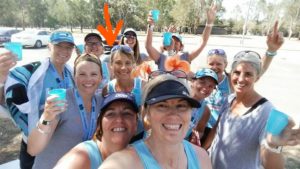Coping with an Injury
Coping with an injury requires both physical and psychological resilience. Athletes react to injuries with a wide range of emotions which may include denial, anger, sadness, and even depression. An injury often seems unfair to anyone who has been physically active and otherwise healthy. Although these feelings are real, it’s important to move beyond the negative and find more positive strategies to cope with this setback. In many cases dealing gracefully with an injury helps an athlete become more focused, flexible, and resilient.
With the right knowledge, support and patience an injury can be overcome without turning your whole world upside down. By taking things slow, setting realistic goals, and maintaining a positive, focused approach, most athletes can overcome minor injuries quickly and major injuries in time. Always make sure you see your doctor for a proper diagnosis and treatment plan for any injury.
The importance of ‘Rest and Recovery’
I have spent the best part of 25+ years thinking that rest or recovery days were simply wasted training opportunities, and for those who wanted an excuse not to train every day. My family, friends and some training partners will nod knowingly when I say I avoided these days like a disease. I have, as my family puts it “ants in my pants’ and can’t sit still, and always have to be doing something. So to have a rest or recovery day was just not something in my mind
set.
But fast forward from mid-20’s, when pounding the body daily seemed ok to now and I wish I had listened to my body a bit more often and taken those needed rest and recovery days. Three-months ago I had surgery on both legs to help my knees. I’ve had pains on/off for about 20-years – the increase in pain always coincided directly with increased training load, to the extent that over past 5-years any running or jogging was painful at best, excruciating at worst. It was also painful to walk downstairs in my own house, walk my kids downhill to school and sadly, I couldn’t really run around much with my kids as my knees hurt too much. Compromising both my training, and importantly, my family life.
My initial recovery from surgery went well – I rested, iced and did my exercises as prescribed. After 4-weeks I was feeling pretty good and started to believe I could get back to training. Here was my mistake. The ‘recovery’ to ‘normal’ meant recovering back to walking…..not to running, 3 hour bike rides or training for a Half-Ironman. A couple of consecutive ‘training’ sessions later without sufficient rest between and my knees ballooned with inflammation.
The next scheduled trip to the physio was totally demoralising, as was the follow-up appointment with the surgeon. I had basically tried to do too-much-too soon…not enough rest or recovery. The outcome was that I put my whole healing back about 4-weeks. But that wasn’t the worst of it…the surgeon just shook his head when I mentioned that I was planning on doing a Half-Ironman 12-weeks later. He advised no hard surface running for another 8-weeks, no swimming except with a pool bouy and to take up deep water running. If I had been feeling frustrated and depressed before… I went to a whole new level of devastation!
I hadn’t been patient enough and had learnt this the really hard way!
I finally ended my pity party and have had to totally change my mindset and goals for the year. I am now focused on ‘what I can do’, not on ‘what I can’t do…..yet’. I am very very grateful to my family, friends and the BEXI community for all supporting me and really helping me in being able to move forward with my recovery.
What I am now committed to doing is to always ensure I do allow myself important rest and recovery times – both now whilst I’m still healing, and more importantly sometime in the future, when I finally get back to proper training. In all honesty I still, and no doubt always will, struggle with the ‘Rest & Recovery’ concept, but I do understand and appreciate the important of both.
Karen Monaghan
BEXI Triathlete

